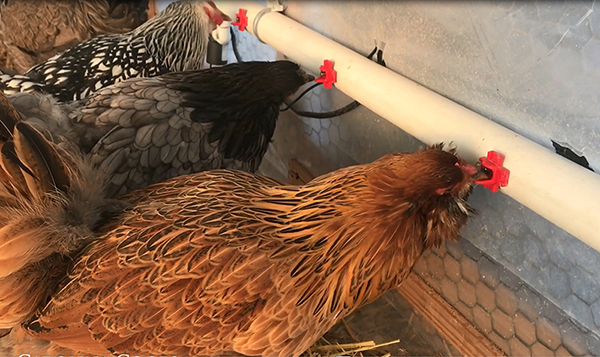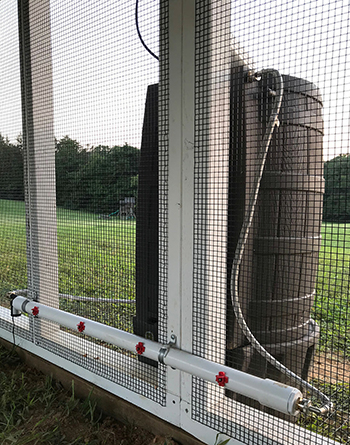4. KEEP THE CHICKENS’ WATER FROM FREEZING
This is a huge challenge for many chicken owners. If you have electric near your coop, our heated poultry water system is really the best way. Even if you aren’t capturing water from the roof to a gutter to the rain barrel, you can still use the rain barrel for a 50 gallons or so of water on tap for your chickens.

This is how it works:
The water in the barrel is gravity fed to the waterbar. Horizontal nipples are best because they don’t drip and the water stays clean.
 When the temperature gets below freezing, a pump connected between the rain barrel and the waterbar and a paddle heater inside the barrel kicks on through a thermostatically controlled outlet.
When the temperature gets below freezing, a pump connected between the rain barrel and the waterbar and a paddle heater inside the barrel kicks on through a thermostatically controlled outlet.
The circulated water doesn’t freeze because it’s constantly moving through the waterbar back in to the rain barrel.
Once the temperature gets above 39° degrees F, the thermostat shuts off.
There are also other ways to heat water with electricity. A heated dog bowl will work and so does a heated hanging poultry fountain. Keep in mind though, it is very awkward to fill and hang again. And with this and the dog bowl, the water gets dirty quickly from the chickens.
If you don’t have electricity near your coop, the best way is just to change out the water every morning. It’s important that chickens always have access to fresh, clean water all the time.






7 Top Winter Care Tips for Backyard Chickens
UPDATED: December 26, 2019
Winter can be tough on backyard chicken owners. Less daylight means less eggs and the cold and snowy weather can make simple chores seem so much worse. Chickens are pretty hardy, but there are some things you can do to help them and you during the cold, dark winter months. Hopefully this will be a helpful guide for how to care for your chickens during the winter.
1. DON’T HEAT THE HENHOUSE
Putting a heat source in your chicken coop is literally playing with fire. The straw and bedding along with the unpredictable motions of chickens is a recipe for disaster. Countless people have had their chicken coops catch fire trying to heat it, when it’s completely unnecessary.
Another thing to consider is that chickens do not do well with extreme changes in temperature. So, for example, if you heat your henhouse and it’s a toasty 65° in there, but when the chickens come out into the run or field and it’s 12° out, the sudden temperature change can be extremely harmful, if not deadly, to them.
Chickens need a more consistent temperature throughout their environments.
P.S. Please do not put sweaters on them either. They are built for their environment, sweaters are another human novelty that will do more harm than good.
2. BLOCK DRAFTS BUT KEEP YOUR COOP VENTILATED
You never want to completely seal off your henhouse during the winter. Chickens give off a lot of moisture with their breathing and their droppings. Sealing it off completely will cause problems with ammonia build up and moisture. Both can cause respiratory problems in your chickens.
You need ventilation always, winter and summer, in your henhouse to keep humidity down and prevent mold in the bedding.
However, you still need to block cold drafts from coming in your coop. Drafts and moisture impair a chickens’ ability to maintain a dry, warm cocoon of air that they need for their well-being in the wintertime.
We have solved this problem with our polycarbonate run covers. These removable covers fit on the inside or outside of your run walls and help keep snow and cold rain out of your run and protect your flock from the elements. (if you don’t see the size you need, just contact us!)
Another thing you can do is lay down straw in the run to give your flock some warmth. You can also put down straw over snow, since chickens are not big fans of walking in the snow.
Also, their wattles and combs can be susceptible to frostbite. You can protect them with petroleum jelly or Green Goo, which is another great product that works for all sorts of cuts and scrapes too.
3. USE THE DEEP LITTER METHOD
All of the Carolina Coops’ chicken coops incorporate the deep litter method. It allows the bedding material in the henhouse (we love the industrial hemp) and the chicken poop to build up and compost over the year. (or even longer!)
It helps promote the beneficial microbes that are necessary for good compost (and chicken health), but it also gives off its own heat, warming the coop at night naturally.
4. KEEP THE CHICKENS’ WATER FROM FREEZING
This is a huge challenge for many chicken owners. If you have electric near your coop, our heated poultry water system is really the best way. Even if you aren’t capturing water from the roof to a gutter to the rain barrel, you can still use the rain barrel for a 50 gallons or so of water on tap for your chickens.
This is how it works:
The water in the barrel is gravity fed to the waterbar. Horizontal nipples are best because they don’t drip and the water stays clean.
The circulated water doesn’t freeze because it’s constantly moving through the waterbar back in to the rain barrel.
Once the temperature gets above 39° degrees F, the thermostat shuts off.
There are also other ways to heat water with electricity. A heated dog bowl will work and so does a heated hanging poultry fountain. Keep in mind though, it is very awkward to fill and hang again. And with this and the dog bowl, the water gets dirty quickly from the chickens.
If you don’t have electricity near your coop, the best way is just to change out the water every morning. It’s important that chickens always have access to fresh, clean water all the time.
5. GATHER EGGS MORE OFTEN
Nobody wants frozen eggs, but there are other reasons you should not let your chickens’ egg freeze in the winter. When an egg freezes, the contents expand, which can cause a small fracture in the shell. This can allow for bacteria to get into the egg, making it unsafe for human consumption.
6. SWITCH UP THEIR DIET IN THE WINTER
Feeding corn and scratch grains to your hens before bedtime is not only a great snack because it fills them up, but it also provides them with warmth during the night as their bodies work to digest it.
Chickens will usually eat more during the winter months to keep their bodies warm so you will want to have plenty of their regular food available to them.
Since bugs and fresh greens are scarce in most parts of the world in the winter, adding greens and dried mealworms or black soldier fly larva are great sources of extra protein. We love Grubblies from Grubbly Farms for this.
Also, during the winter, many chickens may be molting and need extra protein. So the winter is a good time to add meat scraps, canned fish (tuna in water), yogurt, black oil sunflower seeds, and yogurt. You can read our blog post on molting chickens here to find out more!
There are also great herb mixes that can help supplement their diets, such as the Winters Chicken feed supplement from Faith and Farms, another favorite of ours.
7. GIVE THEM BOREDOM BUSTERS AND VARIETY
Since the weather might prevent your chickens from going out exploring and foraging may not be as fruitful, it’s important to give your flock something to do. Hanging cabbage, head of lettuce, or cauliflower from a chain makes for a fun activity, plus they get fresh greens.
Fresh dust baths are also important, if you have a fire place, the ashes are a great addition to a dirt bath mixture.
Another thing to keep in mind is during the winter predators have less readily available food sources, so your chickens can be at a higher risk. For example, owls are known to hunt at dusk during the winter months so keep an eye to the sky and make sure your flock gets inside their coop safely each night.
That’s our top seven winter tips for chickens. It’s important to remember that chickens are very hearty and well-equipped naturally when it comes to winter. Keep in mind, they have survived since they were dinosaurs and they did it without sweaters.